译林版(2019)必修 第一册 Unit 2 Let's Talk Teens Welcome to the unit & Reading课件(共37张PPT,内镶嵌音频)
文档属性
| 名称 | 译林版(2019)必修 第一册 Unit 2 Let's Talk Teens Welcome to the unit & Reading课件(共37张PPT,内镶嵌音频) | 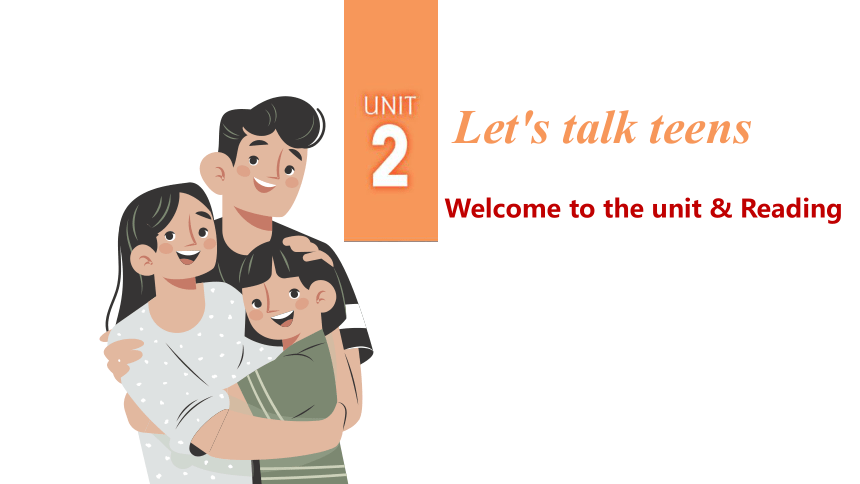 | |
| 格式 | pptx | ||
| 文件大小 | 53.0MB | ||
| 资源类型 | 教案 | ||
| 版本资源 | 牛津译林版(2019) | ||
| 科目 | 英语 | ||
| 更新时间 | 2025-05-01 08:14:41 | ||
图片预览

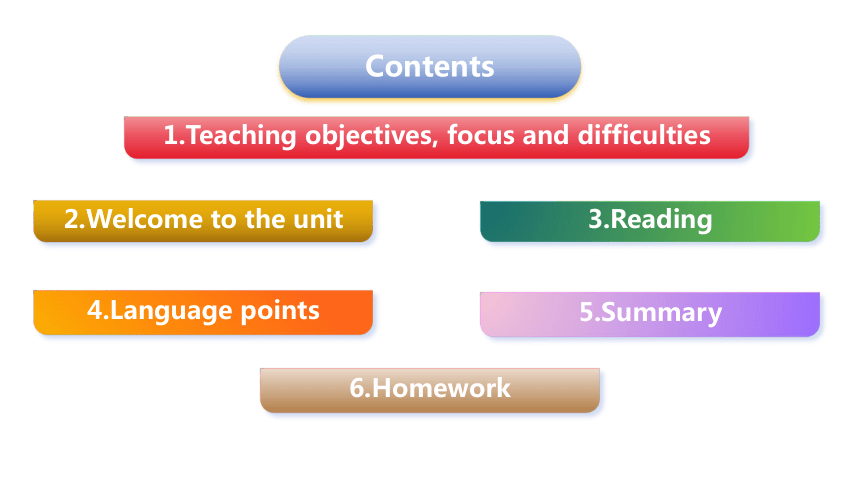
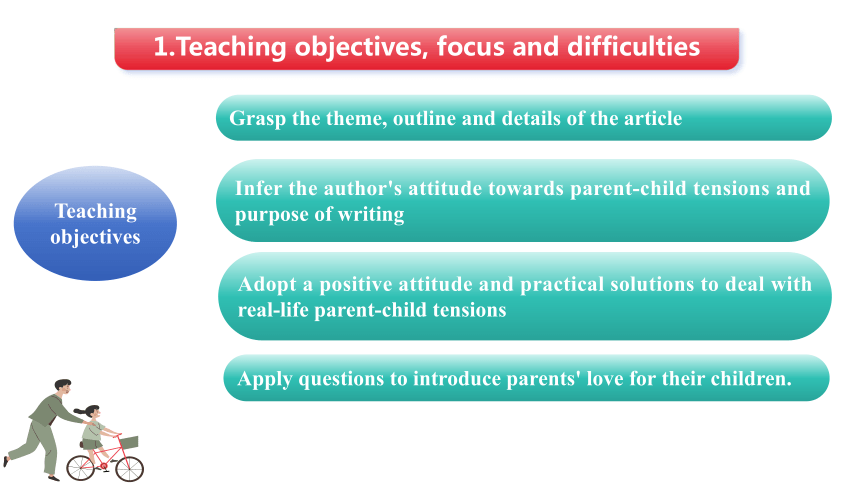

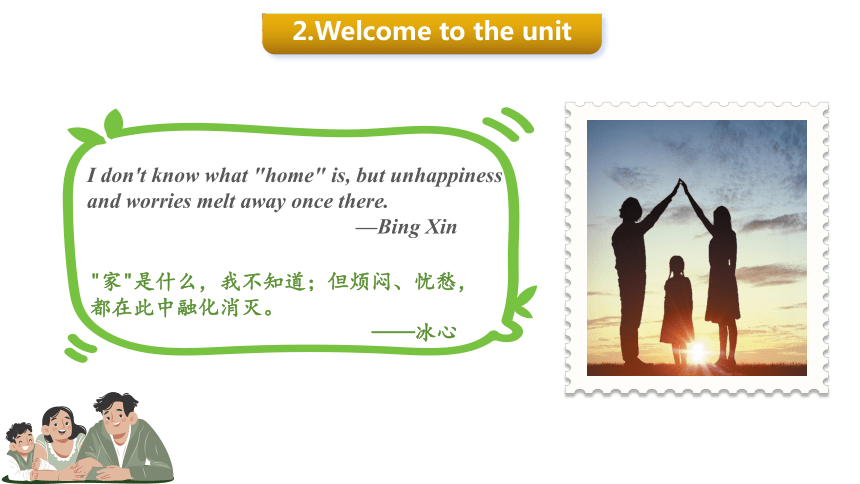

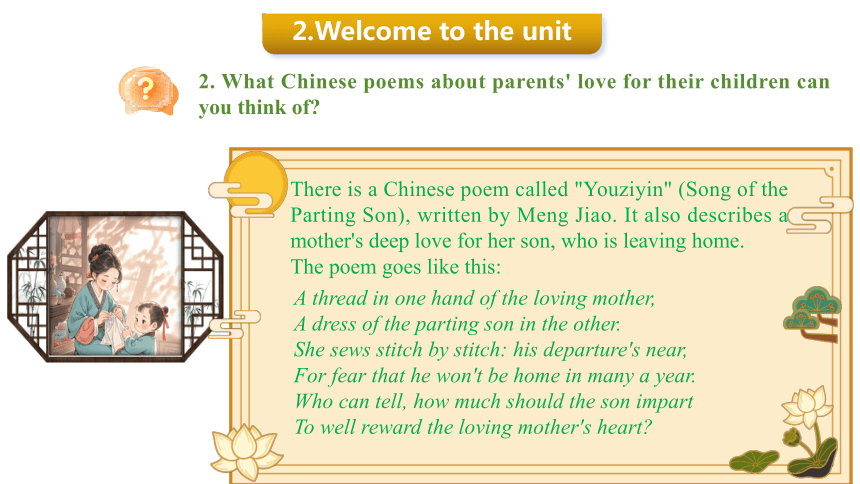
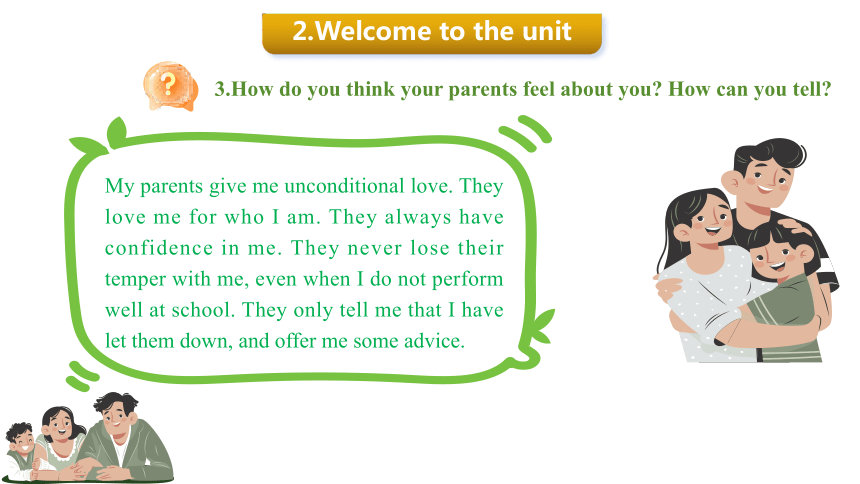
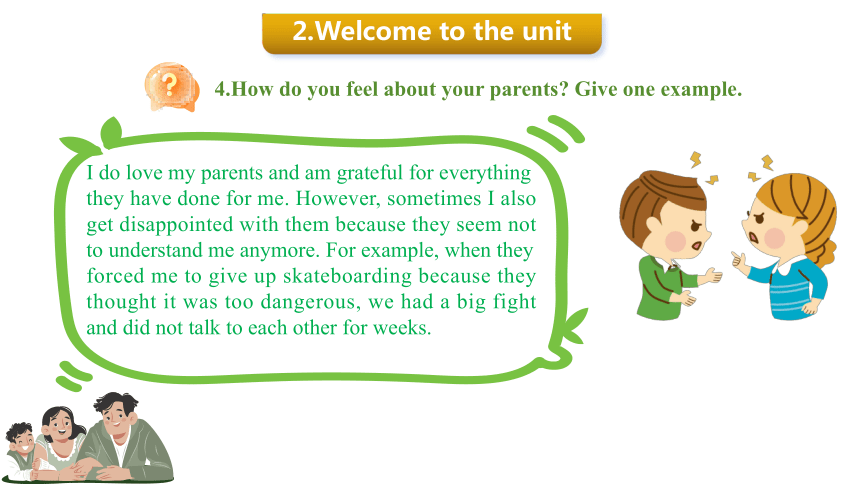
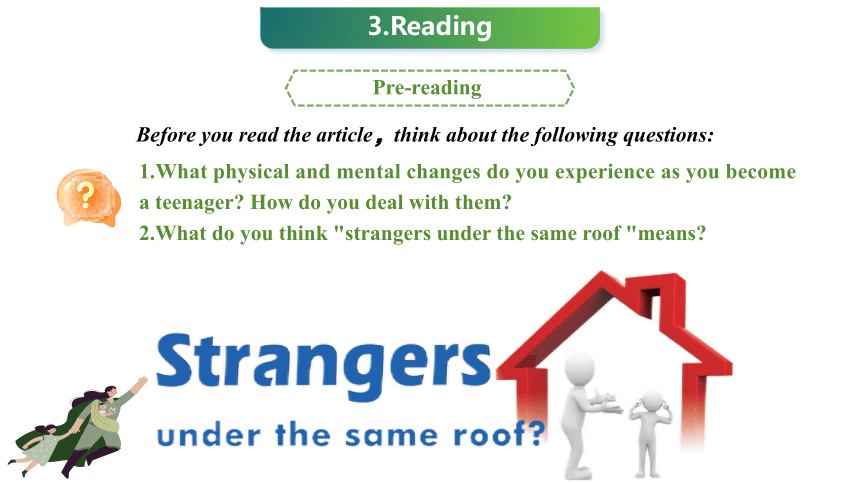

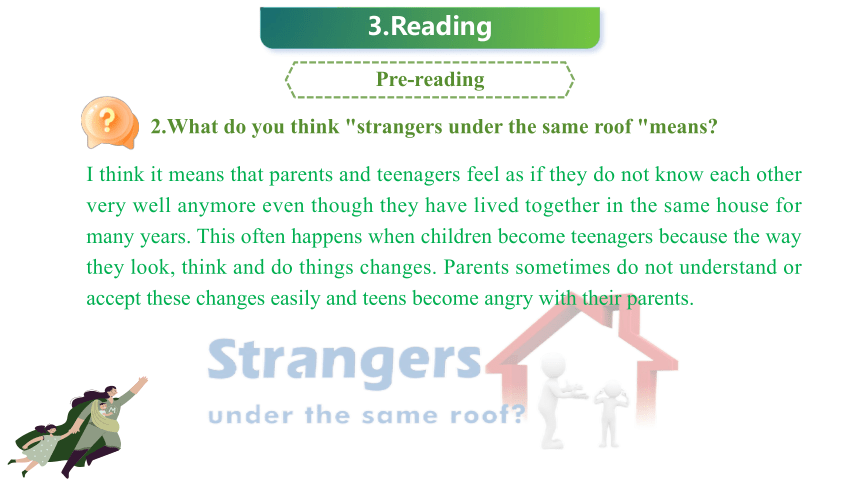
文档简介
(共37张PPT)
Let's talk teens
Welcome to the unit & Reading
Contents
1.Teaching objectives, focus and difficulties
2.Welcome to the unit
3.Reading
5.Summary
4.Language points
6.Homework
Teaching objectives
Grasp the theme, outline and details of the article
Infer the author's attitude towards parent-child tensions and purpose of writing
Adopt a positive attitude and practical solutions to deal with real-life parent-child tensions
Apply questions to introduce parents' love for their children.
1.Teaching objectives, focus and difficulties
Teaching focus
Teaching difficulties
1.Summarize the phenomenon, reasons, and solutions of tense relationships between teenagers and their parents.
2.Master the textual features of argumentative papers.
Appreciate the stylistic features and Stylistic device of the text. Express how to handled relationship with parents correctly during the growth process.
1.Teaching objectives, focus and difficulties
I don't know what "home" is, but unhappiness and worries melt away once there.
—Bing Xin
"家"是什么,我不知道;但烦闷、忧愁,都在此中融化消灭。
——冰心
2.Welcome to the unit
Read the poem below and discuss the following questions in pairs.
1.How would you describe Mother Bird's feelings in the poem
Mother bird has mixed feelings about her baby. On the one hand, she is very protective of her baby. On the other hand, she understands that when her baby has grown up she will have to give it more freedom. However, she will always be there for her baby.
2.Welcome to the unit
2. What Chinese poems about parents' love for their children can you think of
There is a Chinese poem called "Youziyin" (Song of the Parting Son), written by Meng Jiao. It also describes a mother's deep love for her son, who is leaving home.
The poem goes like this:
A thread in one hand of the loving mother,
A dress of the parting son in the other.
She sews stitch by stitch: his departure's near,
For fear that he won't be home in many a year.
Who can tell, how much should the son impart
To well reward the loving mother's heart
2.Welcome to the unit
3.How do you think your parents feel about you How can you tell
My parents give me unconditional love. They love me for who I am. They always have confidence in me. They never lose their temper with me, even when I do not perform well at school. They only tell me that I have let them down, and offer me some advice.
2.Welcome to the unit
4.How do you feel about your parents Give one example.
I do love my parents and am grateful for everything they have done for me. However, sometimes I also get disappointed with them because they seem not to understand me anymore. For example, when they forced me to give up skateboarding because they thought it was too dangerous, we had a big fight and did not talk to each other for weeks.
2.Welcome to the unit
Pre-reading
Before you read the article,think about the following questions:
1.What physical and mental changes do you experience as you become a teenager How do you deal with them
2.What do you think "strangers under the same roof "means
3.Reading
1.What physical and mental changes do you experience as you become a teenager How do you deal with them
As I become a teenager, I get taller and stronger and start to look like an adult. But sometimes I feel shy about how I look, because I look different from my friends. Mentally, I feel more independent in what I do, like making my own decisions. Consequently, I prefer to spend more time with my friends but my parents may get angry with me. In this case, I would speak to my parents so that they understand how I feel.
Pre-reading
3.Reading
Pre-reading
2.What do you think "strangers under the same roof "means
I think it means that parents and teenagers feel as if they do not know each other very well anymore even though they have lived together in the same house for many years. This often happens when children become teenagers because the way they look, think and do things changes. Parents sometimes do not understand or accept these changes easily and teens become angry with their parents.
3.Reading
Fast reading
Para 1:Heated arguments and cold silences are common...
Para 2:Teenagers' physical changes may result in such...
Para 3:It can be a big headache to balance your developing...
Para 5:Just remember that it is completely normal to struggle...
Para 4:Although sometimes it may seem impossible to get ...
L5
L7
L14
L25
L33
Find the topic sentence of each paragraph.
3.Reading
Careful reading
A. Teenagers' physical changes may result in such family tensions.
B.It is common for teenagers to have difficult relationships with their parents.
C.Everything will be all right in the end.
E.Learn when to back down and when to ask your parents to relax their control by regular and honest communication with them.
D.It's a big headache to balance your developing mental needs.
2.Para.2
4.Para.4
1.Para.1
3.Para.3
5.Para.5
BADEC
3.Reading
Careful reading
How does the writer introduce the topic What's the purpose
By asking questions.When a group of questions are used to introduce a topic, they are usually not meant to be answered. Rather, the author intends to draw readers' attention to the topic and make them think about it and take an interest in it.
3.Reading
Read Para. 1 carefully and answer the question.
Careful reading
What may cause family tensions
Six worries
1. Develop ________________
2. ___________ in height
3. ___________ far behind
4. A changing _______
5. _________ problems
6. Red _______
Physical changes
at a different rate
Shoot up
Get left
voice
Weight
spots
3.Reading
Read Para. 2 carefully and complete the blanks.
Complete the following table according to Para. 3 and 4.
Situations Teenagers feel ready to (1)_____________________________ _____________________________. However, parents do not (2)_____________________________. Teenagers who are (3) _________________
_________________ wish their parents could be more caring and patient.
But parents expect
(4)_________________________________.
Mental needs Teenagers have a new desire for independence. Teenagers have a continued need for their parents' love and support.
Solutions Teenagers: calm down; explain themselves calmly; think through the situation from (5)________ point of view; listen carefully and (6)______________________; learn when to (7)________________. learn when to ask parents to (8)_________________________________.
be more responsible and make decisions on their own
always agree
struggling to control their feelings
them to act like adults
parents'
address parents' concerns
back down
relax their control
Careful reading
3.Reading
Careful reading
What does the author mainly do in the last paragraph
A. Summarize the whole passage.
B. Give more suggestions.
C. Offer soothing comforts.
3.Reading
Read Para. 5 carefully and choose the correct answer.
Understanding the text
Introduction
It is common for teenagers to have difficult relationships with their parents.
Cause 1
Cause 2
Solution
Conclusion
Physical changes
Mental changes
Regular and honest communication
Everything will turn out all right in the end
3.Reading
Understanding the text
Teenagers worry about changing voice, weight problems or spots.
It means the teenager is no longer a small child but not quite an adult.
The teenagers feel ready to be more responsible and make decisions on their own but their parents do not always agree.
3.Reading
1. What physical changes might teenagers worry about
2. In line 15,what does "middle ground" mean
3. What does "that" in "that makes you feel unhappy" in line 19 refer to
Understanding the text
When teenagers disagree with their parents, take a minute to calm down and try to understand the situation from their parents' point of view. After they have thought it through, explain their actions and feelings calmly, listen carefully, and address their concerns.
3.Reading
4. How can teenagers have a healthy discussion with their parents
Understanding the text
Para 2
Para 3
Para 4
In pairs, discuss the following questions.
1. What is the author's attitude to parent-child tensions Use information in the magazine article to support your idea.
The author believes parent-child tensions are natural and unavoidable. He argues that the two causes of these tensions are the physical and mental changes that teenagers go through. Although the changes can be stressful, the author thinks that teenagers and their parents can get along better by communicating with each other. He believes that everything will be fine in the end.
3.Reading
Understanding the text
Para 2
Para 3
Para 4
In pairs, discuss the following questions.
2. The magazine article suggests that teenagers want both independence and their parents' love and support. Do you feel the same way or not Give an example.
I feel the same way. Sometimes I wish my parents would treat me like an adult and give me the freedom to make my own decisions. However, when I experience difficulties or setbacks, I would also like their encouragement and comforting words. This makes me feel loved and gives me the courage to keep going.
3.Reading
Understanding the text
Para 2
Para 3
Para 4
In pairs, discuss the following questions.
3. What stresses do the parents of a teenager have to deal with How do they influence the parent-child relationship
Parents may worry about their children's performance at school. If children fail to get good grades, their parents might start to be stricter, believing they are not doing their best. This in turn makes their children upset. Parents may also worry that their children are not making the "right" friends. As a result, they might ask a lot of questions about their children's friends, such as where they are going and what they are doing together. This can make their children feel like they are not trusted.
3.Reading
Building your language
Complete the email with the correct forms of the words and phrases in the box below.
Dear Editor,
I am writing to ask for advice on my relationship with my teenage son. To tell the truth, I often (1)________to get along with him. Recently we have argued with each other a great deal. He is (2)________ about his skin because it has started to become very oily, with lots of red spots. He is always angry these days and seems less confident. I keep telling him that these changes are (3)________, and that things will turn out just fine. Of course, I wanted to show my (4)________ for his condition, so I asked him to see a doctor. But then he became angry and we had a big (5)_________. He told me that I was putting even more (6)________ on him by talking about his spots all time. In the end, I sent him to his room. He finally (7)____________, but it took some time. The whole experience was really terrible and I do not want to (8)____________ the same thing again. What should I do
Best wishes,
Mrs Zhao
struggle
anxious
normal
concern
argument
stress
calmed down
go through
3.Reading
Building your language
If you were the editor, how would you reply to the mum
Dear Mrs Zhao,
Thank you for your letter. I can fully put myself in your shoes, as my teen used to have the same problem — too concerned about his looks. At first, I stepped in by advising him, but it simply added fuel to the flames. Later I took him to the public library and encouraged him to read books on teenage health. He learnt that it is normal for teenagers' skin to grow oilier and then he calmed down. I told him that as long as he is independent and confident, he will feel good. And today, he is a happy confident teenager. So why not take a step back and allow him to think for a while about his situation I am sure that he will welcome your guidance and support.
Best wishes,
XXX
3.Reading
Building your language
Note the following suffixes and think of more abstract nouns formed with them. Then fill in the table below with as many words as you can.
Parts of speech Suffixes Words
Adjectives -ce independence,
-ty/-ity honesty,
Nouns -hood adulthood,
-ship relationship,
Verbs -ment argument,
-tion/-sion communication,
-th growth,
difference, existence, silence, occurrence, reference, conference, appearance, performance, distance, acceptance, assistance
reality, ability, activity, possibility, regularity, nationality, disability, minority
brotherhood, likelihood, neighborhood, childhood, boyhood, girlhood
friendship, partnership, relationship, hardship, readership, scholarship, ownership
government, movement, development, equipment, announcement, punishment, treatment
election, construction, cancellation, dictation, creation, admission, collision, compassion, conclusion, confusion
truth, strength, length, growth, depth
3.Reading
Building your language
The magazine article uses a group of questions to introduce the topic of parent-child tensions. Read the first paragraph of the magazine article and think about the function of these questions.
Function:
When a group of questions are used to introduce a topic, they are usually not meant to be answered. Rather, the author intends to draw the reader's attention to the topic and make them think about and take an interest in it.
3.Reading
Building your language
The magazine article uses a group of questions to introduce the topic of parent-child tensions. Read the first paragraph of the magazine article and think about the function of these questions.
Possible answer
We can do so but I believe it is better to start the article with questions.Not only are we attracted to the article by the questions, but we are also more willing to pay attention to the arguments put forward by the author.
Can we start the article with a group of declarative sentences instead of questions Which way is better and why
3.Reading
1. Does every dinner with your parents seem to turn into a battle
每次和父母一起吃晚餐似乎都会变成一场战争吗
【词汇精讲】
本句中battle用作名词,意为"争论;战斗,搏斗;斗争";也可用作及物动词和不及物动词,用作不及物动词往往和介词against/with连用。
e.g. He battled cancer for four years.
【词汇拓展】
battle against/with与……作斗争
half the battle成功了一半;胜利大有希望
e.g. The two leaders are battling for control of the government.
4.Language points
2. You may feel anxious that you are developing at a different rate to your friends, shooting up in height or getting left far behind.
你可能会感到焦虑,因为你的发展速度和你的朋友们不同,身高方面或者突飞猛进,或是被远远抛在后面。
【词汇精讲】
rate在本句中用作名词,意为"速度;率";还可用作动词,意为"评价,评估"。
e.g. How would you rate it, on a scale from 1 to 10
【词汇拓展】
birth rate出生率 at a rate of以……的速度
e.g. New diet books appear at a rate of nearly one a week.
4.Language points
3.When it all gets too much,your parents are often the first targets of your anger.
当这一切让你不堪重负时,父母常常会成为你发泄愤怒的首选目标。
【词汇精讲】
在本句中target用作名词,意为"(攻击的)目标,对象;靶子";也可用作动词,意为"把……作为攻击目标;面向"。
e.g. The magazine targets those who love cars.
【词汇拓展】
set a target确定目标 be targeted at 目的;旨在;针对
e.g. The program is targeted at improving people's health.
4.Language points
4.You have both a new desire for independence and a continued need for your parents' love and support.
你既对独立充满新的渴望,又对父母的爱与支持有不断的需求。
【词汇精讲】
desire意为"渴望,愿望", 在本句中用作名词,也可用作动词。
e.g. His desire is that he should go to China again.
【词汇拓展】
have a desire to do sth=desire to do sth渴望做某事
have a desire for=desire for渴望
e.g. They had little desire for money.
4.Language points
5.On the other hand,when you are struggling to control your feelings,you wish they could be more caring and patient...
另一方面,当你努力想控制自己的情感时,你希望他们能更体贴和有耐心
【词汇精讲】
struggle vi.& n.斗争;奋斗;搏斗
e.g. The struggle between the two teams was hard.
【词汇拓展】
struggle for 为……而斗争
struggle to do sth努力做某事
e.g. Mary struggled to lift the heavy basket.
4.Language points
Practice
1.Libraries will often hold reading group sessions, which ____________ (target) at various age groups.
2.She's ____________ (struggle) to bring up a family alone.
3.Some teenagers grow up with ____________ (desire)independence.
4.Local businesses are closing ____________ (rate) three a year.
5.Nicolo and another bidder ________ (battle) until Nicolo finally won the paintings for $32.
at the rate of
are targeted
struggling
a desire for
battled
4.Language points
Parent-child tensions are natural and unavoidable,they can get along better by communicating with each other.
By asking questions the author intends to draw the reader's attention and make them think about and take an interest in it.
Abstract nouns refer to ideas or qualities. We can form abstract nouns using certain suffixes.
5.Summary
Write a paragraph to give your suggestions about teenagers' relationship with parents. Try to use questions in the beginning of the paragraph.
6.Homework
Let's talk teens
Welcome to the unit & Reading
Contents
1.Teaching objectives, focus and difficulties
2.Welcome to the unit
3.Reading
5.Summary
4.Language points
6.Homework
Teaching objectives
Grasp the theme, outline and details of the article
Infer the author's attitude towards parent-child tensions and purpose of writing
Adopt a positive attitude and practical solutions to deal with real-life parent-child tensions
Apply questions to introduce parents' love for their children.
1.Teaching objectives, focus and difficulties
Teaching focus
Teaching difficulties
1.Summarize the phenomenon, reasons, and solutions of tense relationships between teenagers and their parents.
2.Master the textual features of argumentative papers.
Appreciate the stylistic features and Stylistic device of the text. Express how to handled relationship with parents correctly during the growth process.
1.Teaching objectives, focus and difficulties
I don't know what "home" is, but unhappiness and worries melt away once there.
—Bing Xin
"家"是什么,我不知道;但烦闷、忧愁,都在此中融化消灭。
——冰心
2.Welcome to the unit
Read the poem below and discuss the following questions in pairs.
1.How would you describe Mother Bird's feelings in the poem
Mother bird has mixed feelings about her baby. On the one hand, she is very protective of her baby. On the other hand, she understands that when her baby has grown up she will have to give it more freedom. However, she will always be there for her baby.
2.Welcome to the unit
2. What Chinese poems about parents' love for their children can you think of
There is a Chinese poem called "Youziyin" (Song of the Parting Son), written by Meng Jiao. It also describes a mother's deep love for her son, who is leaving home.
The poem goes like this:
A thread in one hand of the loving mother,
A dress of the parting son in the other.
She sews stitch by stitch: his departure's near,
For fear that he won't be home in many a year.
Who can tell, how much should the son impart
To well reward the loving mother's heart
2.Welcome to the unit
3.How do you think your parents feel about you How can you tell
My parents give me unconditional love. They love me for who I am. They always have confidence in me. They never lose their temper with me, even when I do not perform well at school. They only tell me that I have let them down, and offer me some advice.
2.Welcome to the unit
4.How do you feel about your parents Give one example.
I do love my parents and am grateful for everything they have done for me. However, sometimes I also get disappointed with them because they seem not to understand me anymore. For example, when they forced me to give up skateboarding because they thought it was too dangerous, we had a big fight and did not talk to each other for weeks.
2.Welcome to the unit
Pre-reading
Before you read the article,think about the following questions:
1.What physical and mental changes do you experience as you become a teenager How do you deal with them
2.What do you think "strangers under the same roof "means
3.Reading
1.What physical and mental changes do you experience as you become a teenager How do you deal with them
As I become a teenager, I get taller and stronger and start to look like an adult. But sometimes I feel shy about how I look, because I look different from my friends. Mentally, I feel more independent in what I do, like making my own decisions. Consequently, I prefer to spend more time with my friends but my parents may get angry with me. In this case, I would speak to my parents so that they understand how I feel.
Pre-reading
3.Reading
Pre-reading
2.What do you think "strangers under the same roof "means
I think it means that parents and teenagers feel as if they do not know each other very well anymore even though they have lived together in the same house for many years. This often happens when children become teenagers because the way they look, think and do things changes. Parents sometimes do not understand or accept these changes easily and teens become angry with their parents.
3.Reading
Fast reading
Para 1:Heated arguments and cold silences are common...
Para 2:Teenagers' physical changes may result in such...
Para 3:It can be a big headache to balance your developing...
Para 5:Just remember that it is completely normal to struggle...
Para 4:Although sometimes it may seem impossible to get ...
L5
L7
L14
L25
L33
Find the topic sentence of each paragraph.
3.Reading
Careful reading
A. Teenagers' physical changes may result in such family tensions.
B.It is common for teenagers to have difficult relationships with their parents.
C.Everything will be all right in the end.
E.Learn when to back down and when to ask your parents to relax their control by regular and honest communication with them.
D.It's a big headache to balance your developing mental needs.
2.Para.2
4.Para.4
1.Para.1
3.Para.3
5.Para.5
BADEC
3.Reading
Careful reading
How does the writer introduce the topic What's the purpose
By asking questions.When a group of questions are used to introduce a topic, they are usually not meant to be answered. Rather, the author intends to draw readers' attention to the topic and make them think about it and take an interest in it.
3.Reading
Read Para. 1 carefully and answer the question.
Careful reading
What may cause family tensions
Six worries
1. Develop ________________
2. ___________ in height
3. ___________ far behind
4. A changing _______
5. _________ problems
6. Red _______
Physical changes
at a different rate
Shoot up
Get left
voice
Weight
spots
3.Reading
Read Para. 2 carefully and complete the blanks.
Complete the following table according to Para. 3 and 4.
Situations Teenagers feel ready to (1)_____________________________ _____________________________. However, parents do not (2)_____________________________. Teenagers who are (3) _________________
_________________ wish their parents could be more caring and patient.
But parents expect
(4)_________________________________.
Mental needs Teenagers have a new desire for independence. Teenagers have a continued need for their parents' love and support.
Solutions Teenagers: calm down; explain themselves calmly; think through the situation from (5)________ point of view; listen carefully and (6)______________________; learn when to (7)________________. learn when to ask parents to (8)_________________________________.
be more responsible and make decisions on their own
always agree
struggling to control their feelings
them to act like adults
parents'
address parents' concerns
back down
relax their control
Careful reading
3.Reading
Careful reading
What does the author mainly do in the last paragraph
A. Summarize the whole passage.
B. Give more suggestions.
C. Offer soothing comforts.
3.Reading
Read Para. 5 carefully and choose the correct answer.
Understanding the text
Introduction
It is common for teenagers to have difficult relationships with their parents.
Cause 1
Cause 2
Solution
Conclusion
Physical changes
Mental changes
Regular and honest communication
Everything will turn out all right in the end
3.Reading
Understanding the text
Teenagers worry about changing voice, weight problems or spots.
It means the teenager is no longer a small child but not quite an adult.
The teenagers feel ready to be more responsible and make decisions on their own but their parents do not always agree.
3.Reading
1. What physical changes might teenagers worry about
2. In line 15,what does "middle ground" mean
3. What does "that" in "that makes you feel unhappy" in line 19 refer to
Understanding the text
When teenagers disagree with their parents, take a minute to calm down and try to understand the situation from their parents' point of view. After they have thought it through, explain their actions and feelings calmly, listen carefully, and address their concerns.
3.Reading
4. How can teenagers have a healthy discussion with their parents
Understanding the text
Para 2
Para 3
Para 4
In pairs, discuss the following questions.
1. What is the author's attitude to parent-child tensions Use information in the magazine article to support your idea.
The author believes parent-child tensions are natural and unavoidable. He argues that the two causes of these tensions are the physical and mental changes that teenagers go through. Although the changes can be stressful, the author thinks that teenagers and their parents can get along better by communicating with each other. He believes that everything will be fine in the end.
3.Reading
Understanding the text
Para 2
Para 3
Para 4
In pairs, discuss the following questions.
2. The magazine article suggests that teenagers want both independence and their parents' love and support. Do you feel the same way or not Give an example.
I feel the same way. Sometimes I wish my parents would treat me like an adult and give me the freedom to make my own decisions. However, when I experience difficulties or setbacks, I would also like their encouragement and comforting words. This makes me feel loved and gives me the courage to keep going.
3.Reading
Understanding the text
Para 2
Para 3
Para 4
In pairs, discuss the following questions.
3. What stresses do the parents of a teenager have to deal with How do they influence the parent-child relationship
Parents may worry about their children's performance at school. If children fail to get good grades, their parents might start to be stricter, believing they are not doing their best. This in turn makes their children upset. Parents may also worry that their children are not making the "right" friends. As a result, they might ask a lot of questions about their children's friends, such as where they are going and what they are doing together. This can make their children feel like they are not trusted.
3.Reading
Building your language
Complete the email with the correct forms of the words and phrases in the box below.
Dear Editor,
I am writing to ask for advice on my relationship with my teenage son. To tell the truth, I often (1)________to get along with him. Recently we have argued with each other a great deal. He is (2)________ about his skin because it has started to become very oily, with lots of red spots. He is always angry these days and seems less confident. I keep telling him that these changes are (3)________, and that things will turn out just fine. Of course, I wanted to show my (4)________ for his condition, so I asked him to see a doctor. But then he became angry and we had a big (5)_________. He told me that I was putting even more (6)________ on him by talking about his spots all time. In the end, I sent him to his room. He finally (7)____________, but it took some time. The whole experience was really terrible and I do not want to (8)____________ the same thing again. What should I do
Best wishes,
Mrs Zhao
struggle
anxious
normal
concern
argument
stress
calmed down
go through
3.Reading
Building your language
If you were the editor, how would you reply to the mum
Dear Mrs Zhao,
Thank you for your letter. I can fully put myself in your shoes, as my teen used to have the same problem — too concerned about his looks. At first, I stepped in by advising him, but it simply added fuel to the flames. Later I took him to the public library and encouraged him to read books on teenage health. He learnt that it is normal for teenagers' skin to grow oilier and then he calmed down. I told him that as long as he is independent and confident, he will feel good. And today, he is a happy confident teenager. So why not take a step back and allow him to think for a while about his situation I am sure that he will welcome your guidance and support.
Best wishes,
XXX
3.Reading
Building your language
Note the following suffixes and think of more abstract nouns formed with them. Then fill in the table below with as many words as you can.
Parts of speech Suffixes Words
Adjectives -ce independence,
-ty/-ity honesty,
Nouns -hood adulthood,
-ship relationship,
Verbs -ment argument,
-tion/-sion communication,
-th growth,
difference, existence, silence, occurrence, reference, conference, appearance, performance, distance, acceptance, assistance
reality, ability, activity, possibility, regularity, nationality, disability, minority
brotherhood, likelihood, neighborhood, childhood, boyhood, girlhood
friendship, partnership, relationship, hardship, readership, scholarship, ownership
government, movement, development, equipment, announcement, punishment, treatment
election, construction, cancellation, dictation, creation, admission, collision, compassion, conclusion, confusion
truth, strength, length, growth, depth
3.Reading
Building your language
The magazine article uses a group of questions to introduce the topic of parent-child tensions. Read the first paragraph of the magazine article and think about the function of these questions.
Function:
When a group of questions are used to introduce a topic, they are usually not meant to be answered. Rather, the author intends to draw the reader's attention to the topic and make them think about and take an interest in it.
3.Reading
Building your language
The magazine article uses a group of questions to introduce the topic of parent-child tensions. Read the first paragraph of the magazine article and think about the function of these questions.
Possible answer
We can do so but I believe it is better to start the article with questions.Not only are we attracted to the article by the questions, but we are also more willing to pay attention to the arguments put forward by the author.
Can we start the article with a group of declarative sentences instead of questions Which way is better and why
3.Reading
1. Does every dinner with your parents seem to turn into a battle
每次和父母一起吃晚餐似乎都会变成一场战争吗
【词汇精讲】
本句中battle用作名词,意为"争论;战斗,搏斗;斗争";也可用作及物动词和不及物动词,用作不及物动词往往和介词against/with连用。
e.g. He battled cancer for four years.
【词汇拓展】
battle against/with与……作斗争
half the battle成功了一半;胜利大有希望
e.g. The two leaders are battling for control of the government.
4.Language points
2. You may feel anxious that you are developing at a different rate to your friends, shooting up in height or getting left far behind.
你可能会感到焦虑,因为你的发展速度和你的朋友们不同,身高方面或者突飞猛进,或是被远远抛在后面。
【词汇精讲】
rate在本句中用作名词,意为"速度;率";还可用作动词,意为"评价,评估"。
e.g. How would you rate it, on a scale from 1 to 10
【词汇拓展】
birth rate出生率 at a rate of以……的速度
e.g. New diet books appear at a rate of nearly one a week.
4.Language points
3.When it all gets too much,your parents are often the first targets of your anger.
当这一切让你不堪重负时,父母常常会成为你发泄愤怒的首选目标。
【词汇精讲】
在本句中target用作名词,意为"(攻击的)目标,对象;靶子";也可用作动词,意为"把……作为攻击目标;面向"。
e.g. The magazine targets those who love cars.
【词汇拓展】
set a target确定目标 be targeted at 目的;旨在;针对
e.g. The program is targeted at improving people's health.
4.Language points
4.You have both a new desire for independence and a continued need for your parents' love and support.
你既对独立充满新的渴望,又对父母的爱与支持有不断的需求。
【词汇精讲】
desire意为"渴望,愿望", 在本句中用作名词,也可用作动词。
e.g. His desire is that he should go to China again.
【词汇拓展】
have a desire to do sth=desire to do sth渴望做某事
have a desire for=desire for渴望
e.g. They had little desire for money.
4.Language points
5.On the other hand,when you are struggling to control your feelings,you wish they could be more caring and patient...
另一方面,当你努力想控制自己的情感时,你希望他们能更体贴和有耐心
【词汇精讲】
struggle vi.& n.斗争;奋斗;搏斗
e.g. The struggle between the two teams was hard.
【词汇拓展】
struggle for 为……而斗争
struggle to do sth努力做某事
e.g. Mary struggled to lift the heavy basket.
4.Language points
Practice
1.Libraries will often hold reading group sessions, which ____________ (target) at various age groups.
2.She's ____________ (struggle) to bring up a family alone.
3.Some teenagers grow up with ____________ (desire)independence.
4.Local businesses are closing ____________ (rate) three a year.
5.Nicolo and another bidder ________ (battle) until Nicolo finally won the paintings for $32.
at the rate of
are targeted
struggling
a desire for
battled
4.Language points
Parent-child tensions are natural and unavoidable,they can get along better by communicating with each other.
By asking questions the author intends to draw the reader's attention and make them think about and take an interest in it.
Abstract nouns refer to ideas or qualities. We can form abstract nouns using certain suffixes.
5.Summary
Write a paragraph to give your suggestions about teenagers' relationship with parents. Try to use questions in the beginning of the paragraph.
6.Homework
